Some of Greater Colombo’s public areas have become veritable mosquito breeding “factories” and havens of pollution.
Less than a half-hour’s drive from the Ministry of Health, the nerve centre from which anti-dengue operations are being directed, is the once picturesque Boralesgamuwa Lake.
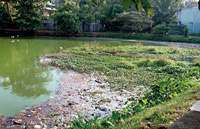 |
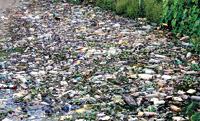 |
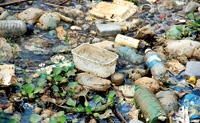 |
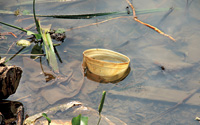 |
| Pollution reigns and man-made mosquito-breeding opportunities increase by the day: once clean and beautiful, Boralesgamuwa lake is now choked with garbage, plastic containers and polythene bags. Waste water from houses and effluents from development work add to the stink. Photos: Indika Handunwela and Reka Tharangani |
A two-and-a-half kilometre gravel road skirts the bund of the lake. Mosquitoes are breeding by the billions. Drainpipes from the Maharagama town end at the lake, emptying out vast quantities of sludge. Plastic bottles, carcasses of monitor lizards, and even dead birds float. The stench from the algae-ridden water is unbearable. And things are made worse by houses surrounding the lake directing all their waste water into the lake. Houses under construction have drainpipes laid under the gravel road through which cement-mixed water flows into the lake.
Despite the environmental hazards and pollution, the area is still full of bird life. Egrets and cranes, and hundreds of ducks and pelicans, perch on treetops on two small islands in the lake.
Residents blame the Maharagama Municipal Council for the filth and mess.
Kanthi Kodikara says she is to have discussions with the Urban Development Authority so they may acquire the area. Till then, the residents will have to put up with the growing menace of mosquitoes.
“Every day I pray that my grandchild does not fall sick,” says 56-year-old Iranganie Weliwita, who lives in a house near the lake bund. “I spend money every day on mosquito coils and I have purchased a mosquito net to protect my child. We have to close our doors and windows by 4 pm. There have been several dengue cases in the area.”
Gunadasa Lokuhewa, 61 years, accused the Maharagama Municipal Council of not taking measures to clean the lake. Even the stretch of lake along the main Maharagama-Boralesgamuwa Road is covered with filth, polythene bags, and bottles.
“CMC officials come to check whether our houses are clean, but they are not concerned about the lake and the waste water being dumped every da,” he said.
Maharagama Municipal Council mayor Kanthi Kodikara told the Sunday Times that the Urban Development Authority is moving to take charge of the lake. “We cannot clean the lake as long as it is not our official responsibility,” she said.
The authorities are already cracking down on state offenders.
On Friday, the Ratmalana railway yard chief engineer was fined Rs.17,500. He was charged under the Mosquito Breeding Prevention Act for ignoring official warnings and continuing to maintain a mosquito-breeding environment.
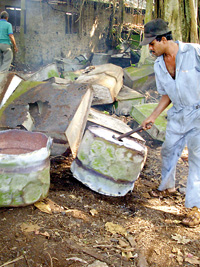 |
Railway yard labourers are potential
victims. |
Two workers at the railway yard died from dengue fever, and hundreds of railway employees have fallen ill as a result of mosquito-borne diseases.
There are three abandoned wells that are breeding mosquitoes in huge numbers, according to people living in the area.
The railway yard is littered with old machinery, unused rail carriages, and discarded metal parts that contain stagnant water alive with mosquito larvae. Blocked drains and gutters are not helping matters.
he anti-dengue campaign has been largely targeting homes and householders.
But the bigger offenders by far are government bodies. State-owned lands, buildings and premises, as well as drainage systems and canals – by and large all these potential mosquito-breeding grounds are neglected, with no authority to oversee these sites or monitor conditions.
The Mosquito Breeding Prevention Act is to be amended to sharpen the focus on owners and occupants of private residences, commercial premises, and state institutions. Spot fines and even jail terms will be introduced.
Last week, officials of the Presidential Task Force for Dengue Control demanded an explanation from the head of a government institution for failing to maintain the premises and allowing mosquito-breeding spots.
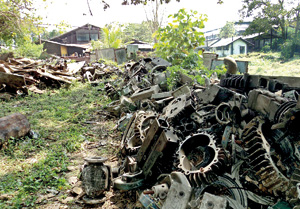 |
| The Ratmalana railway yard is littered with odds and ends containing larvae-infested water. |
“The head of any state institution found guilty of breeding mosquitoes will be held accountable, and will have to submit a letter of explanation to the Presidential Secretary,” said Deputy Director General of Public Health, Dr. Sarath Amunugama. “This could apply to government department heads, directors of hospitals, school principals.”
This was one of the decisions made at the Presidential Secretariat last Tuesday when the Dengue Task Force held discussions with a gathering of officials, including the President’s Secretary, ministers, and the Secretaries of the Health, Defence, Local Government, Environment, Disaster Management and Education ministries. During Dengue Prevention Week, which ran from January 16 to 22, legal action was taken against 6,182 owners of houses and offices.
A Dengue Control Unit report sent to the Minister of Health says that 80,920 out of 465,917 houses and housing complexes inspected across all districts were “maintaining a dengue-breeding environment.”
The main mosquito breeding spots appear to be abandoned or neglected lands, government housing schemes, canals, drains, schools, places of worship, machinery storage centres, and railway workshops.
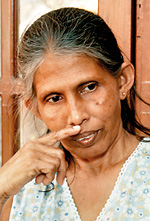 |
| Mrs. Weliwita:
a child at risk |
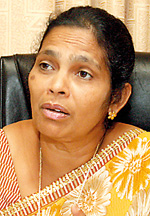 |
| Kanthi Kodikara, UC Chairman |
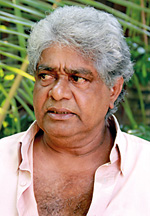 |
| Gunadasa Loku-hewa: concerned |
Last month, there were 18 deaths from dengue and 3,664 cases of dengue-related illness. In 2011, 185 persons died from dengue fever. Colombo records the highest number of dengue deaths and dengue illness. In January, Colombo district recorded six deaths and 1,033 cases of dengue fever.
The health department has identified a number of breeding sites in a number of state-run institutions and land plots, according to Colombo Municipal Council Chief Medical Officer Dr. Pradeep Kariyawasam.
“Inside the Port, mosquitoes are breeding in abandoned vehicles and machinery, and we have instructed the Customs to do the needful,” he said. “The square near the National Hospital is another heavy mosquito breeder, and should be regularly inspected.”
Other sites listed as breeders are government housing schemes and quarters, including those of the railway and the police, bus depots, railway stations, and the premises of the government printing press.
“We don‘t usually want to take government employees to court, but we issue notices to the relevant secretaries,” Dr. Kariyawasam said.
Entomology-trained assistants play a key role in identifying mosquito larvae. Providing technical support, they visit sites, collect samples and send these for laboratory tests. The final reports are sent to the Medical Officers of Health (MOH) in the respective areas.
Entomological Officers Association Secretary K. D. N. Sumanasena said offending state institutions should feel the full force of the law. “Our entomological surveillances reveal that the railway department housing scheme in Ratmalana breeds mosquitoes in large numbers. The larvae can hatch dengue and filarial carriers.
The labour department office in Galle and the nurses’ quarters in Polonnaruwa are breeding mosquitoes. Action was taken against the Petroleum Corporation for creating a breeding environment in Kolonnawa,” Mr. Sumanasena said.
Some places found to be heavy breeders, such as the medical college hostel in Kynsey Road and the Panagoda Army Camp, have already cleaned up their act, he said, adding that garment factories, industrial sites, and bus depots, such as the Thalangama bus depot, are also heavy breeders.
“In out-station areas, schools and hospitals are big breeders,” he said.
Dr. Nihal Jayatilake, Secretary to the Ministry of Local Government and Provincial Councils, said local authorities had a responsibility to keep their respective areas mosquito-free, and should be careful in managing solid waste.
“We have instructed local government commissioners to work with Provincial Directors of Health in controlling the dengue menace,” Dr Jayatilake said. “Any local authority that fails to follow proper waste management systems and mosquito control will have to face punitive action.”
| Malaria virus arrives with visitors coming from India and African countries |
Malaria is on the increase in Sri Lankia, health officials warn, despite an anti-malaria campaign under way to eliminate the disease by 2014.
The malaria virus is brought in by travellers and tourists, officials say. The chief carriers are visitors from India and Sri Lankans visiting India and African nations.
“A number of Sri Lankans going on business trips to African countries return infected with the virus,” said Dr. U. G. Kaluaarachchi, who is on the Health Ministry’s anti-malaria team.
People travelling to countries with a malaria problem should take preventive treatment before they leave, Dr. Kaluaarachchi, adding that pilgrims leaving for India tend to be reluctant about taking preventive treatment.
Last year, 124 cases of malaria were reported, especially in the North. There were 51 cases of malaria-infected persons entering the country. |
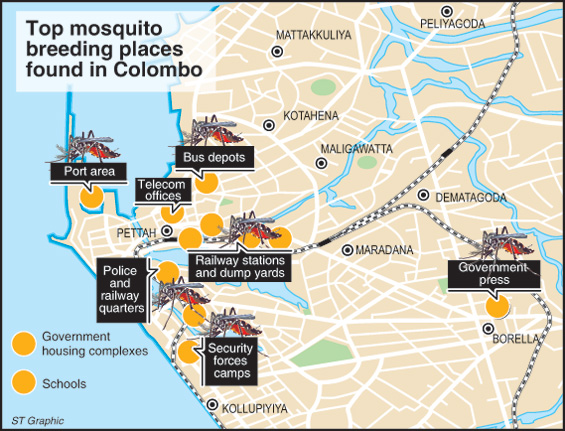
|











